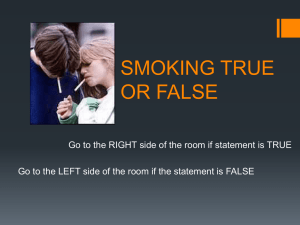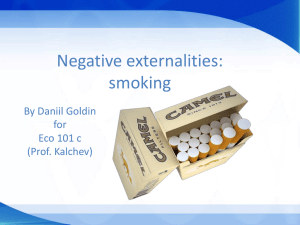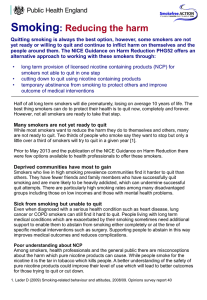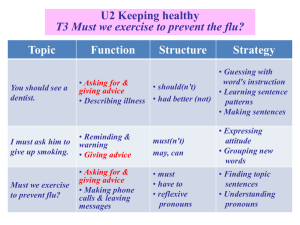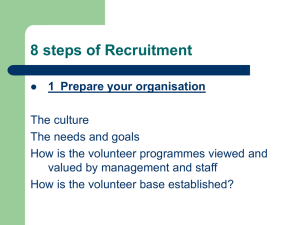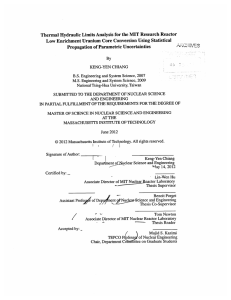Stop Smoking conference slides
advertisement
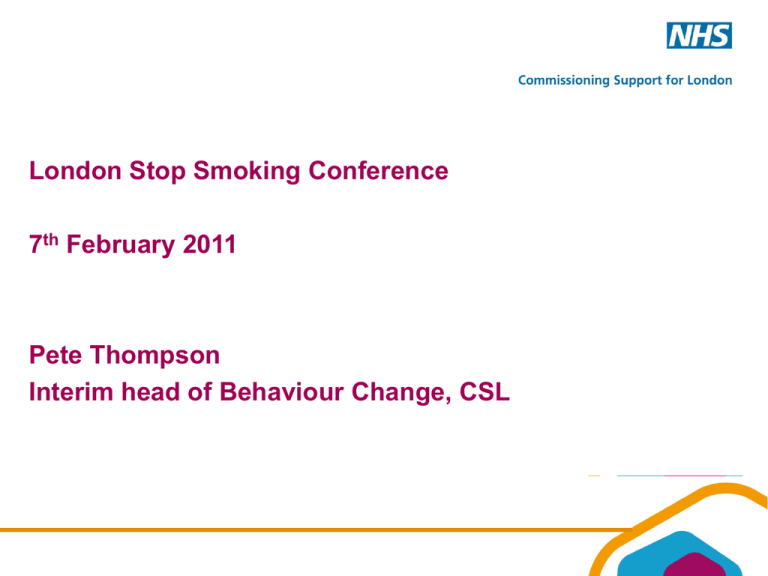
London Stop Smoking Conference 7th February 2011 Pete Thompson Interim head of Behaviour Change, CSL Recruitment to smokefree services Local – the majority of recruitment occurs at the local level and relies on effective relationships with a wide variety of stakeholders including referrals from GPs, pharmacies, dentists, mental health providers, secondary care, prisons, schools etc. Regional – London regional activity has aimed to support recruitment by running ad hoc London wide seasonal marketing campaigns that raise awareness at regional level, recruit smokers and pass their details to local services to follow up. National – National activity run by the Department for Health provides a national source of awareness and recruitment to stop smoking services via marketing campaigns, national media coverage and a telephone helpline Evaluation of Spring 2010 London recruitment campaign Each London PCT adopted one type of engagement method: Roving ASDA Pharmacy Roving Areas within the PCT with a high penetration of R&M workers were targeted for field marketing. Identified by EMO ‘heat maps’. 3 The roving method generated the highest volume of response 25,000 20,000 Response Volume 15,000 10,000 5,000 0 Total Contacts (Total Response) Leaflets Handed Out (Valid Response) Leads generated (Intermediate Conv Level 1) ASDA 13,035 1,807 1,116 PHARMACY 17,650 2,004 1,212 ROVING 22,650 2,825 1,150 Roving activity generates the highest volume of overall contacts (total response), but this does not translate into higher volumes of leads (Intermediate conversion L1). 4 ASDA activity was more effective at encouraging respondents to sign up for contact from their LSSS 16% 14% 14% 12% Response Conversion Rate 12% 11% 10% 9% 8% 7% 6% 5% 4% 2% 0% Leaflets Handed Out (Valid Response) Leads generated (Intermediate Conv Level 1) ASDA 14% 9% PHARMACY 11% 7% ROVING 12% 5% Pharmacy and ASDA activity were better than roving activity at converting contacts into leads – principally driven by immediate referrals. 5 ASDA activity drove the highest number of successful smoking quitters 14,000 12,000 10,000 Response Volume 8,000 6,000 4,000 2,000 0 Total Contacts (Total Response) Leaflets Handed Out (Valid Response) Leads generated (Intermediate Conv Level 1) Appointment Set (Intermediate Conv Level 2) Appointment Attended (Intermediate Conv Level 3) Quit (Full Conversion) ASDA 9,185 1,362 792 422 61 30 PHARMACY 8,700 1,220 709 170 32 10 12,850 1,052 514 44 8 2 ROVING High drop off from Intermediate Conv L2 to Full Conversion – this is due to immediate appointments not being followed up through the PCTs. We may be under-reporting large number of quits generated by ASDA / Pharmacy activity! 6 Response overview – breakdown by follow-up method: Response Level Description Standard LSSS* SMS & LSSS SMS & Telemarketer Total Spend Inc management fee, print, production, uniforms, field work, SMS, digi-pen reporting, training & telemarketers £25,725 £20,968 £33,285 Intermediate Conv L2 Appointments set 124 158 206 Intermediate Conv L3 Appointments attended 26 33 42 Full Conversion Quits smoking 7 15 20 7 ASDA engagement method is more effective across all follow-up methods 100% 86% Appointment Setting Conversion Rate 90% 77% 80% 70% 64% 60% 50% 40% 33% 37% 28% 30% 20% 15% 14% 17% 10% 0% Asda Standard LSSS Pharmacy SMS & LSSS Roving SMS & Telemarketer ASDA is always the most effective venue for lead conversion regardless of follow-up method. SMS & Telemarketer is always most effective follow-up method regardless of engagement method. 8 Key Findings Using SMS follow-up method appears to improve conversion rates: Both follow-up methods using SMS mechanism have improved conversion rates. This is most pronounced at Full Conversion level Both SMS & LSSS and SMS & Telemarketer follow-up method are at least 50% more effective at driving leads through to quitting than the standard LSSS approach. Using telemarketers delivers a higher conversion volume – but at a higher cost. Using LSSS staff with the SMS follow-up is more cost effective (but will not deliver volume). OVERALL: Roving is most cost effective engagement method for making initial contacts ASDA appears the most effective engagement method for conversion through the response hierarchy The SMS & Telemarketers folllow-up method appears most effective for driving leads through to quitting smoking. 9 Most leads claim talking to field marketers about their Local NHS Stop Smoking Services has motivated them to stop smoking The average lead said they were now motivated at a score of 8 on a scale of 1 -10 : Overwhelmingly talking to field marketers appeared to provide significant motivation to stopping smoking. Less than 5% of leads said they did not feel motivation to quit smoking after talking with field marketers (rating lower than 5 out of 10). There were no differences between men and women and their motivation levels. Only those leads that went on to quit smoking rated their motivation to quit higher than the average score of 8 out of 10. Leads acquired through ASDA activity claimed slightly higher motivation levels than those during Roving or Pharmacies – this is borne out in the conversion rates for ASDA leads. We should however, consider whether leads answer questions put to them by field marketers honestly. 10 Feedback from PCTs - A summary of recommendations …. Planning Briefing Implementation Consult LSSS earlier in the process and use their knowledge of local area to optimise timing and location of activity Run face to face briefings with LSSS Encourage involvement at F2F activity – face to face teams should contact LSSS before activity to talk through the day Set up a panel of LSSS to engage in planning Understand what PCTs want - do they want F2F activity? what type of activity do they want? Give LSSS the option of what acquisition and follow up method they use Map local, regional and national activity and share with LSSS to avoid clashes in activity Issue briefing pack to support face to face brief Sell in the benefits of the campaign Include a description of the activity/follow up/ data capture - clearly outline roles and responsibilities Have a single point of contact for pushing out information Provide data capture sheets and a description of data required at initial briefing and emphasis importance Provide mechanism for LSSS to feedback on F2F activity to drive engagement Provide additional resource for follow up Evaluation Make business case for all LSSS to have electronic databases Provide additional resource for lead tracking Standardise data tracking sheets Deliver leads to LSSS electronically where possible Schedule data requests so they do not coincide Investigate potential of populating tracking sheets with unique number Regional recruitment in London summary Street roving very good at engaging with large numbers of smokers, but conversion to quit is relatively poor. Room for improved contact management to encourage access to service at later date when smoker ready. Engaging clearly good but justification of spend v impact on actual quits? Static stands in areas with high prevalence of routine and manual smokers deliver lower volume than roving but more effective in conversion to quit. Because individual smokers are on a journey, there are times when they are more motivated to quit than others. Vary from smoker to smoker, when recruiting smokers to services they may not be sufficiently motivated immediately, so services would benefit from effective contact management strategy Mystery shopping of Stop Smoking Services in London In spring 2010, ten mystery shop calls were made to each of the 29 stop smoking services in London At the first attempt, six in ten (63%) were able to speak to a call handler. For the 102 calls which were answered by a machine, 100 were able to leave a message. 53% of those leaving a message on the machine were not called back within a seven day cut-off period Only 28% were called back within 24 hours. Mystery shopping of Stop Smoking Services in London Feedback about the call handlers themselves is quite positive – they are considered to be friendly and succeed in making the callers feel comfortable. However, helpfulness. Knowledge and enthusiasm could be improved Four in ten callers were given the opportunity by the call handler to book an appointment with an advisor or group while three in ten were provided with a number or encouraged to call the service back. Of those who were given the option of postal information, four in ten had still not received anything after the 7 day cut-off point. SSS must ensure that any information requested gets to the callers efficiently. Potential quitters may lose determination if requested help is not forth coming Recommendations from London regional campaigns Business case for regional level recruitment campaigns not clear Costs v number of quits not compelling, but data issues… Paper based contact management system needs to be replaced by electronic if ever to be properly effective £ value of engagement? If planning on street or location based recruitment activity use geo demographic tools such as ACORN to help target the correct locations for recruiting routine and manual workers if don’t know local area well Understand the costs at a local level of different methods of recruitment of smokers to services, bearing in mind health inequalities Recommendations from London regional campaigns Costs of retention vs acquisition – is the balance of resources correct? How cost effective methods of recruitment can be expanded to provide more leads Database ability to accurately record details of ‘prospects’ from recruitment to outcome and seamlessly allow transfer of data At times when have more potential recruits to stop smoking services than resource to deal with immediately have a contact strategy in place to keep prospects warm, for example, text a confirmation acknowledging contact and follow up phone calls.
